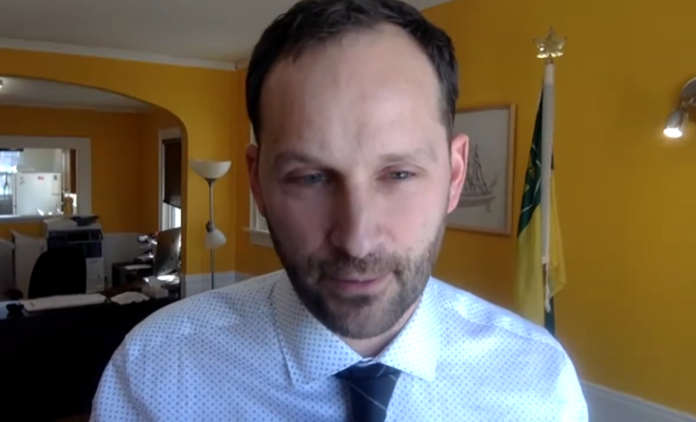
Saskatchewan’s NDP is calling for more stringent social distancing measures, more frequent testing and better information as the number of cases of COVID-19 in the province continue to grow.
Leader of the Opposition Ryan Meili spoke to reporters from his Saskatoon office over the phone and using videoconferencing tools on Tuesday as he urged the provincial government to do even more to slow down the onset of the disease.
Meili’s call came as internal Saskatchewan Health Authority memos showed the provincial health system is preparing for thousands to need care as the pandemic spreads.
“People are really worried … about our response as a province,” Meili told reporters on Tuesday.
“When we hear things like (Chief Medical Health Officer Dr. Shaqib) Shahab saying 30-70 per cent of the population will be affected, that’s worrisome. It’s also worrisome for people to be seeing information about the steps that could have been taken that weren’t taken as quickly as possible.”
Meili’s comments were referring to a CBC story published Monday that spoke to an epidemiologist — an expert who studies epidemics. That expert said Saskatchewan was not prepared and moved too slowly.
Meili acknowledged the concern but stressed that the focus should be on today and tomorrow, not yesterday.
“There will be a time someday to look back at what steps may have been taken,” Meili said.
“We have to focus on today and tomorrow to get us on the road to what is best of Saskatchewan.”
Meili echoed Shahab’s comments that this is a “critical moment” for the province’s pandemic response plan and a key time to bring the virus under control and prevent the illness while also reducing the amount of time the province deals with disruptions to daily life in an effort to contain COVID-19.
To do that, Meili suggested, Saskatchewan needs to expand its testing, expand the information coming out to the public and expand its emergency measures.
He cited actions taken in Ontario, where clear guidelines were put into place for physical distancing so that clients and workers of businesses in essential roles could be protected.
That would mean ordering non-essential businesses to shut down.
Meili also called on the province to go beyond testing just those who had travelled or been in contact with a traveller or prior case to anyone who has symptoms of COVID-19.
Meili said the province has enough tests right now to do that, though it needs action from the federal government to make more tests available. He argued that testing should be done now and not reserved for later.
“Expand that sentinel testing,” he argued. “Find everyone who’s tested positive, find their contacts and quarantine everyone until they show they’re not positive themselves.”
He said countries that have taken such an aggressive approach, such as South Korea, have managed to slow the spread. Other nations, such as Italy, have seen it skyrocket and overwhelm the health care system.
“We are able to — in this critical, crucial period — do that testing now.”
Though Saskatchewan has tested the third most residents per capita amongst provinces and the fifth most per capita when territories are included as well, Meili said the province isn’t being as aggressive as it could.
“That’s how we’ll, early on, catch those cases that are community transmission,” he said.
‘that’s how we’ll be able to trace those cases and their contacts.”
He also criticized the province’s approach to release less information as the pandemic spread. While it used to say whether residents are self-isolating at home, and in which communities the virus has spread, that information has trickled to only say that “most” are self-isolating at home, and identify regions, not specific communities, affected by the virus.
“We need more information. Are they just fine and at home? Or are they at the ICU? There’s zero reason these can’t be made public.”
Reporters have been asking the same questions of public health officials. The officials have said details about how many patients are recovering in the ICU would violate privacy.
They have, though committed to updating those statistics twice per week.
Other provinces, though, have released some of that data. Alberta has been updating the number of cases that resulted in hospitalizations and in cases referred to the ICU. Ontario has been giving more specific geographic information, such as what communities cases are detected in.
Meili also wants the province to share what its models look like, so people have a sense of how bad things could be, and how much of a difference those social distancing measures can make.
“I think the government should be sharing all of the information they have,” he said. “If they have modelling, that’s something (Saskatchewan) should see.
All three steps, Meili argued, are required to slow the spread of COVID-19.
“We can go down the road of countries like Italy or countries like South Korea,” he said.
“I think we can make a good news story out of this, but only if we act now.”

